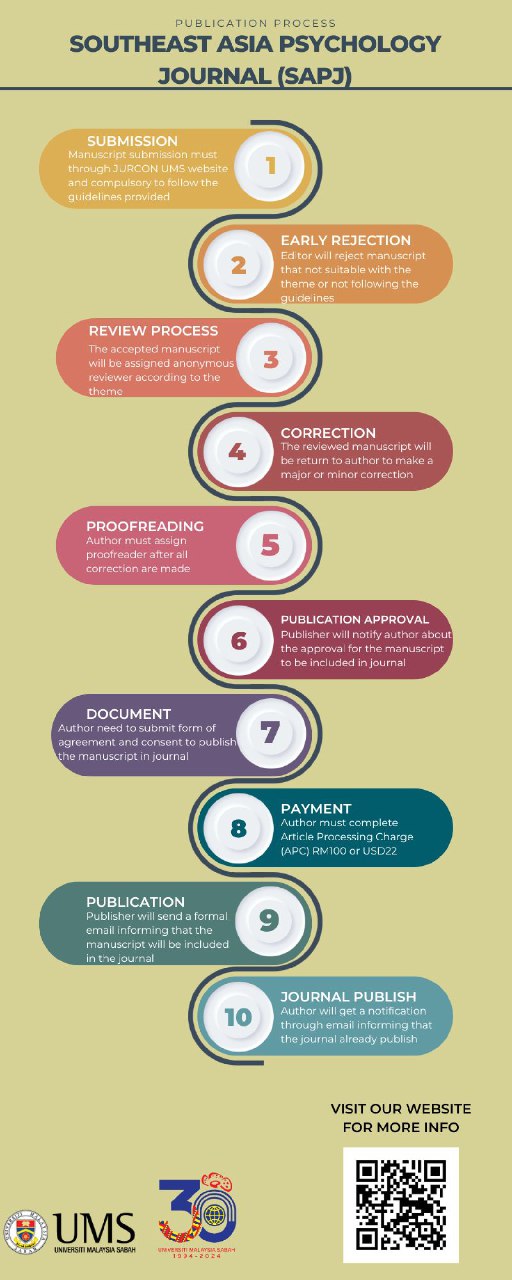COMPARING THE PSYCHOLOGICAL WELL-BEING AND JOB PERFORMANCE BETWEEN MALE AND FEMALE EMPLOYEES IN UNIVERSITI MALAYSIA SABAH: COVID-19 POST PANDEMIC STUDY
DOI:
https://doi.org/10.51200/sapj.v10i2.4945Keywords:
Gender, Psychological Well-being, Job Performance, EmployeeAbstract
The COVID-19 pandemic has a significant impact on individual’s psychological well-being and job performance. This study aimed to examine the relationship between psychological well-being and job performance among male and female employees at Universiti Malaysia Sabah (UMS) in the post-pandemic period. A total of 152 employees participated in an online survey that assessed psychological well-being (using Psychological Well-being Survey) and job performance (using the Individual Work Performance Questionnaire- IWPQ). Results of a t-test revealed that female employees had significantly higher levels of most psychological well-being dimensions (autonomy, environmental mastery, personal growth, relations with others and self-acceptance). However, no significant difference was found between male and female employees in term of purpose in life dimension in psychological well-being. Meanwhile findings showed that female employees had significantly higher levels of two dimensions in job performance (task performance and conceptual performance) but not significant in counterproductive work behavior dimension in job performance. These findings suggest that male and female employees do differ in psychological well-being and job performance in the post-pandemic period. To determine strategies for promoting the psychological well-being and job performance of all employees in the post-pandemic period, further research is required to investigate potential explanations for these findings.
References
Diener, E., & Ryan, K. (2009). Subjective Well-Being: A General Overview. South African Journal Of Psychology, 39(4), 391-406.
Feng, Z., & Savani, K. (2020). Covid-19 created a gender gap in perceived work productivity and job satisfaction: implications for dual-career parents working from home. Gender In Management: An International Journal, 35(7/8), 719-736.
Gómez-Baya, D., Lucia-Casademunt, A., & Salinas-Pérez, J. (2018). Gender Differences in Psychological Well-Being and Health Problems among European Health Professionals: Analysis of Psychological Basic Needs and 68 Job Satisfaction. International Journal Of Environmental Research And Public Health, 15(7), 1474. Gualano M.R., Lo Moro G., Voglino G., Bert F., Siliquini R. (2020). Effects of COVID-19 lockdown on mental health and sleep disturbances in Italy. Int. J. Environ. Res. Public Health;17:4779.
Hyde, J. (2014). Gender Similarities and Differences. Annual Review Of Psychology, 65(1), 373-398.
Karasawa, M., Curhan, K., Markus, H., Kitayama, S., Love, G., Radler, B., & Ryff, C. (2011). Cultural Perspectives on Aging and Well-Being: A Comparison of Japan and the United States. The International Journal Of Aging And Human Development, 73(1), 73-98.
Koopmans, L., Thierry, H., & van der Heiden, B. I. (2013). The individual work performance Questionnaire (IWPQ): Development and validation of a measure to assess the individual-level components of team performance. Journal of Occupational and Organizational Psychology, 86(4), 445-465.
Matud, M., López-Curbelo, M., & Fortes, D. (2019). Gender and Psychological Well Being. International Journal Of Environmental Research And Public Health, 16(19), 3531.
Meyer, B., Zill, A., Dilba, D., Gerlach, R., & Schumann, S. (2021). Employee psychological well-being during the COVID-19 pandemic in Germany: A longitudinal study of demands, resources, and exhaustion. International Journal of Psychology,1 – 19. Muller A.E., Hafstad E.V., Himmels J.P.W., Smedslund G., Flottorp S., Stensland S.Ø., Stroobants S., Van de Velde S., Vist G.E. (2020). The mental health impact of the COVID-19 pandemic on healthcare workers, and interventions to help them: A rapid systematic review. Psychiatry Res;293:113441.
O’Kelly, M. (2013). Self-Acceptance in Women. The Strength Of Self-Acceptance, 229-246.
Rathore, S., & Mertia, S. (2021). Self Acceptance Among Working women and Homemakers. Mukt Shabd Journal, 9(7). Retrieved 18 September 2022, from. http://shabdbooks.com/gallery/210-july2020.pdf
Robb, A., & Watson, J. (2012). Gender differences in firm performance: Evidence from new ventures in the United States. Journal Of Business Venturing, 27(5), 544-558.
Ryff, C. D. (1989). Happiness is everything, or is it? Explorations on the meaning of psychological well-being. Journal of Personality and Social Psychology, 57(6), 1069-1081.
Sougou, N., Bassoum, O., Faye, A., & Leye, M. (2020). Women’s autonomy in health decision-making and its effect on access to family planning services in Senegal in 2017: a propensity score analysis. BMC Public Health, 20(1).








